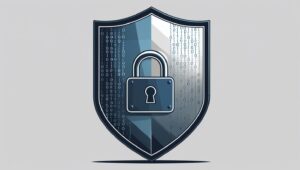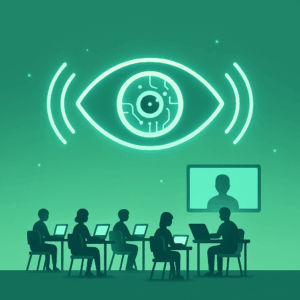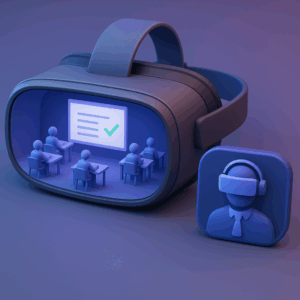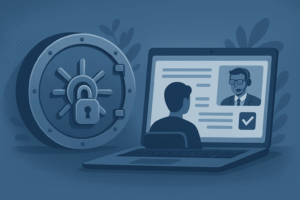As education increasingly moves online, remote exams have become the norm. With this shift, exam proctoring tools have grown more common, used by institutions to uphold academic integrity and prevent cheating. But with great surveillance comes a great deal of concern. Students often wonder: Am I trading my privacy for a fair exam? This blog examines the tension between security and privacy in online testing and how solutions like Proctortrack aim to bridge that gap with smarter, student-first design.
The Rise of Online Proctored Exams
Remote learning brought flexibility, but also new challenges. Unlike traditional classrooms where invigilators oversee exams, online testing relies on software to ensure fairness. Enter proctoring tools.
These platforms monitor students through their webcams, microphones, and sometimes screen activity. Some even use AI to detect suspicious behavior. While these features aim to deter cheating, they’ve also sparked privacy concerns among students, educators, and regulators.
It is one thing to read about our amazing solution and another to experience it in action.
Proctoring is no longer just about watching—it’s about how we watch, what data we collect, and how its utilization happens. Today’s students are more digitally aware and expect transparency, control, and ethical data handling.
Tools like Proctortrack have stepped into this evolving space, not only with powerful security tools but also with thoughtful approaches to privacy. It’s no longer enough to be effective—proctoring solutions must also be ethical.
Understanding the Privacy Debate
Proctoring, at its core, involves surveillance. That makes privacy a natural concern.
Students may feel anxious about being recorded in their homes. They worry about being flagged by AI for harmless behaviors, such as looking away to think. They may also question how their data—video footage, ID scans, behavioral patterns—is stored and who can access it.
In response, institutions are under pressure to select tools that align with data privacy regulations, such as GDPR, FERPA, and other global standards. Transparency is crucial—users should know exactly what is being collected, for what purpose, and for how long.
Proctortrack, for example, addresses these concerns with a strong privacy policy and student-first design. The platform offers clear consent screens, minimal data collection aligned with institutional needs, and automatic deletion of data after specified periods. Its privacy settings can be customized by schools, allowing educators to strike a balance between monitoring and student comfort.
Moreover, smart solutions use a modular system. Institutions can turn functions on or off depending on the stakes of the exam. For example, low-stakes quizzes may only need light monitoring, while final exams can use the full suite of tools. This helps avoid “blanket surveillance” and promotes proportional proctoring.
Can We Have Both Security and Privacy?
Yes—but it requires thoughtful design and transparent practice.
Modern proctoring solutions, such as Proctortrack, demonstrate that the future of online testing isn’t an either/or choice. With the right technology, exams can be both secure and respectful of personal space.
A proactive security approach minimizes cheating risks while ensuring a seamless test experience at budget-friendly pricing.
Know our Pricing!
Here’s how Proctortrack strikes this balance:
- Flexible Monitoring Levels: Not all tests are the same. Proctortrack allows educators to choose from various proctoring modes—from AI-only to live or hybrid models—so students are not under excessive monitoring.
- Automated Privacy Protections: Data is encrypted and stored only for the duration needed. Face scans, ID verification, and videos are not kept indefinitely. Students and schools can review policies and request deletions.
- User Transparency: Every student interaction begins with a clear explanation of what elements are under the tracking mechanism. There is no concealment of trackers, and user consent is always the first step.
- Scalable Integrity Tools: While focused on privacy, Proctortrack doesn’t compromise on integrity. Its AI can detect multiple people in the room, switching tabs, and other red flags, all while allowing legitimate behavior like stretching or thinking aloud.
Importantly, Proctortrack doesn’t take a one-size-fits-all approach. Its tools are adaptable, enabling a smoother experience across K-12, higher ed, and professional certifications.
As institutions look for responsible proctoring, the question shifts from “Can we watch?” to “How can we watch fairly?” And that’s where platforms like Proctortrack shine—by building trust through transparency and control.
Summing up
So, can you have both proctored exams and privacy? With the right platform, the answer is a confident yes.
Finding the best online proctoring services is crucial for maintaining the credibility of exams. Online exam proctoring software helps detect suspicious activity in real time. Educators use remote proctoring for tests to supervise students from anywhere. An AI proctoring for online exams system flags potential violations automatically. A secure online test proctoring solution ensures data protection and fairness. Many institutions deploy proctor software for universities to streamline assessments. If you’re wondering how online proctoring works, it combines AI and human oversight. Affordable remote proctoring solutions make it accessible for all budgets. For high-stakes tests, online proctoring for certification exams is a must. The debate between live vs. automated proctoring depends on specific needs.
Proctoring doesn’t have to feel intrusive. When designed with empathy, clarity, and strong privacy protections, it can uphold exam integrity without invading personal space. Tools like Proctortrack represent this next generation of ethical proctoring—balancing technology, trust, and transparency.
As we continue embracing digital learning, students and institutions alike deserve solutions that make security and privacy partners, not opponents. With smart choices, we can ensure that fairness in exams doesn’t come at the cost of personal freedom.











